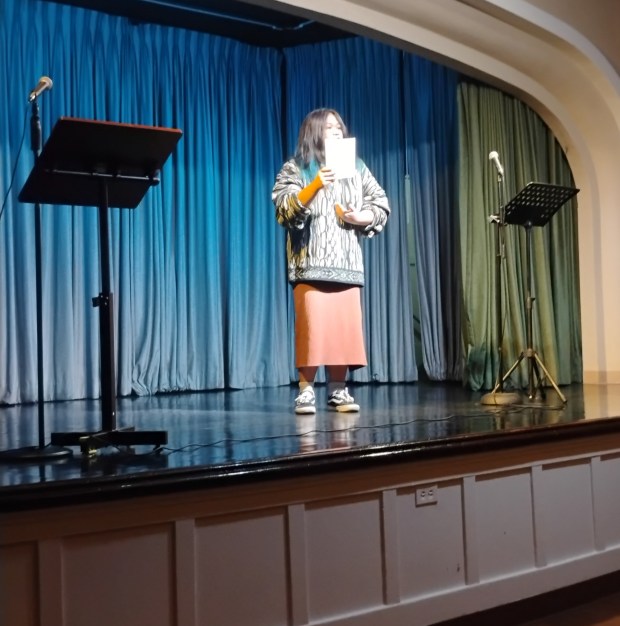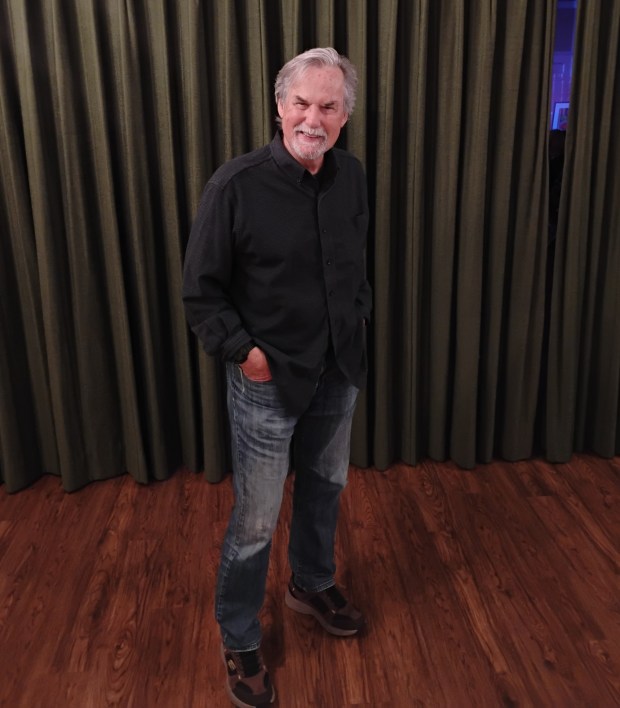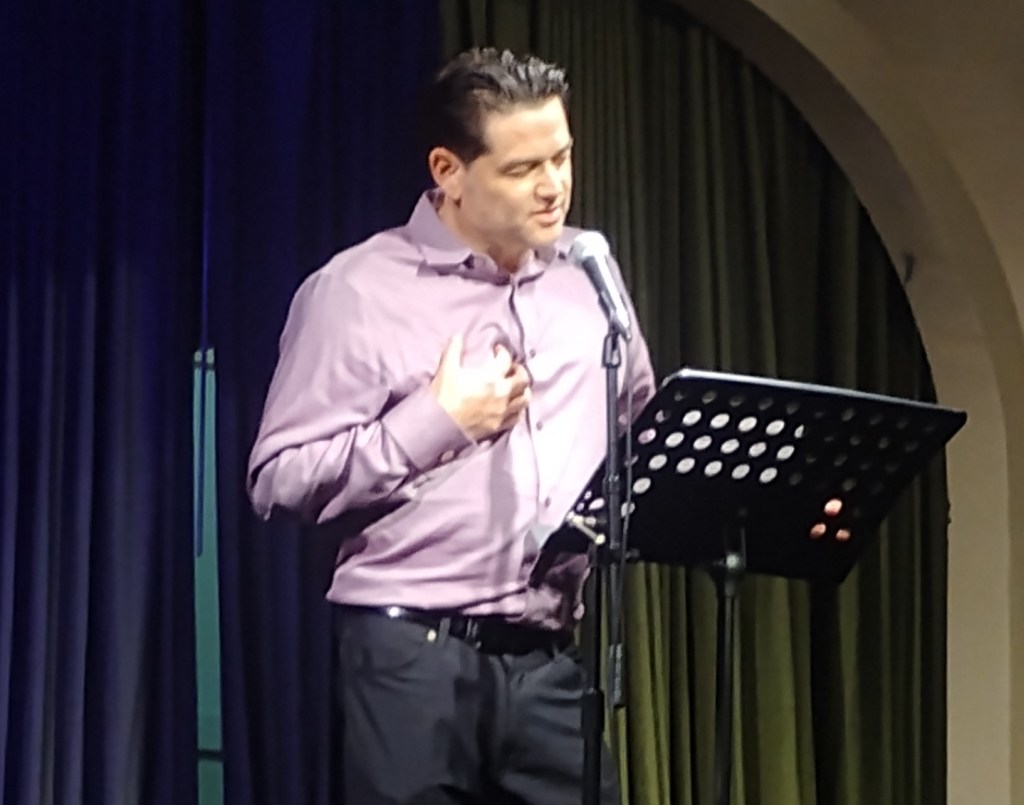As actor Heidi Dotimas reached the closing line of Sonnet 138 — “Therefore I lie with her and she with me / And in our faults by lies we flattered be” — director Tom Haine couldn’t hold back.
From his spot in the front of the 80-seat Point Loma Assembly Hall on Talbot Street, he leaned forward, nodding furiously, and shouted “Yes!” The approximately 50 people in attendance followed his lead, breaking into raucous applause that filled the room.
“Tom has a huge passion for Shakespeare that comes out of every pore of him,” Dotimas said. “That influenced me to develop a love for the work. Even now I’m working with some friends in my own community space to read Shakespeare on our own because we were inspired by Tom. So we’re reading ‘Macbeth’ in my apartment.”
Dotimas was performing in the “Shakespeare Extravaganza” on Nov. 1, the culmination of Haine’s six-week Shakespeare Unfolded workshop presented by ActLiveNow, with sessions meeting once a week.
Ten actors of various ages and performing backgrounds — from seasoned professionals to enthusiastic workshop newcomers and including Haine’s daughter Lilly [“I forced my daughter – how disgusting is that?” he said] — took the stage to showcase their work.
 Heidi Dotimas performs Shakespeare’s Sonnet 138. (Noah Perkins)
Heidi Dotimas performs Shakespeare’s Sonnet 138. (Noah Perkins)
The performance offered a mix of sonnets and soliloquies from some of Shakespeare’s most celebrated plays, giving both the actors and the audience a chance to explore The Bard’s timeless language and themes.
“The love of Shakespeare — that’s what I want the audience to take away from the performance,” Haine said.
Before performing Sonnet 29, Andy Heil described it as “the Judi Dench sonnet — Woe is me, life’s not what it’s supposed to be,” putting his own impassioned spin on it.
“This is the antithesis of modern naturalistic acting,” Haine said. “The thing about Shakespeare that is extraordinary is there is no subtext. With modern plays, the first thing the actors ask is, ‘What is it that I am exploring?’ Shakespeare provides that in the language. He is the first one who explored what a soliloquy is — a soliloquy is an actor onstage alone talking about their thoughts and sharing them with the audience.”
Haine pointed to “To be or not to be” from “Hamlet,” performed that evening by Corey Pahanish, as an example.
“’To be or not to be’ is working through a problem that Hamlet wants the people in the audience to help him figure out. … That is a novelty with actors; you don’t see that with Tennessee Williams. That’s one of the attractions of Shakespeare [to actors] — it’s so wide open.”
 Tom Haine is the director of the Shakespeare Unfolded workshop and its “Shakespeare Extravaganza” show. (Noah Perkins)
Tom Haine is the director of the Shakespeare Unfolded workshop and its “Shakespeare Extravaganza” show. (Noah Perkins)
Haine highlighted the adolescent love in “Romeo and Juliet” and the fear of dementia in “King Lear” as examples of why Shakespeare has remained timeless.
“The reason Shakespeare is always done for the last 400 or 500 years is he provides every point of the emotional journey that an individual has in life,” he said. “His plays are like a series of poems — the density of language is hard to comprehend and turns people off, but once you get it, you will never find anything more creative or ingenious at exploring the intricacies of life.”
The universality of Shakespeare’s language was illustrated in Heil’s performance of Sonnet 73.
“Tom gave me this sonnet this week,” Heil said. “A high school friend just passed away fairly young. This sonnet imagines a beloved’s love for him growing even stronger in the face of death. A beautiful concept.”
Heil’s performance drew loud applause and frequent encouragement from Haine.
Haine, a longtime attorney for the Border Patrol and U.S. attorney’s office, first discovered Shakespearean acting three decades ago while taking a class with longtime Old Globe theater associate Jonathan McMurtry.
“He was a Shakespeare expert,” Haine said. “He turned me on to the genius of Shakespeare. It could be academics, where someone explores the language, but it has to be acting. You can’t just read Shakespeare and think ‘This is something I really love.’ You have to see it and hear it in order to really appreciate the language.”
Dotimas, who has a background in musical theater, had heard of ActLiveNow from friends who had taken classes, but she went into the workshop with limited knowledge of Shakespeare.
“Shakespeare feels a lot like ballet in the sense that you are learning a lot of the basics and this wonderful, beautiful prose,” she said. “It was such a wonderful gift to have this opportunity.”
Dotimas also performed “Thou art not holy to belie me so” from “King John” and said the passage resonated deeply with her own experiences of grief.
“The first time I read it, I started sobbing because it was so reminiscent of my own experiences,” she said.
The evening’s performers also included Laura Ganz-Holtan, Susan O’Neil, Sam Hargrove, Mark Petrich, Laura Gracie and Rebecca Reisman.
“The actors do extraordinary work,” Haine said.
Registration is opening soon for the next six-week Shakespeare Unfolded acting workshop, which will start in January. To find out more, visit actlivenow.com.
